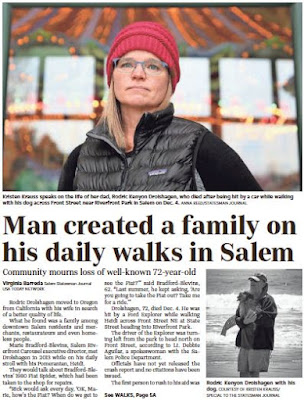For families and friends who must mourn, it is of course an awful thing to revisit the original violence and facts of an untimely road death.
There is good reason to want to celebrate the victim with a kind of encomium.
With the Carousel right there at the end of State Street, and Carousel staff as witness and first responder, the crash was also located at an important cultural node and geographical point in Salem.
As a tribute to the pleasures of daily strolling in the city it has significance.
There are many reasons an encomium and wider feature story makes sense. And it is genuinely moving.
 |
| Front page today |
 |
| Erasing the driver: "hit by car" passive construction |
 |
| "Hit by car" online |
"No citations have been issued," and so the paper may feel they must dance around ascribing intent or fault. It could also just be autoist habit and custom. At the moment, we lack ways and rhetorical norms to talk about driver agency and responsibility when an event falls short of any criminal culpability or lesser violation. Even when there is legal innocence, there is still a driver in charge of and responsible for the safe operation of a motor vehicle. (And if citations are ever issued, it will be long after the initial framing of "hit by car" prevailed.)
This is our autoism. We have a legal and liability system that tolerates a wide range of driver error before any fault is officially assigned. Negligence and criminality must meet a very high bar. We have a road system that tolerates a wide range of driver error and forgives it for those protected by a sheet metal exoskeleton, often at the expense of other more vulnerable road users. We have a cultural system that rose early in the 20th century to absolve drivers and it settled on "was hit by a car" as useful expression to avoid messy ambiguity or uncertain legal responsibility. In so many ways we protect and subsidize drivers at the expense of other road users.
In this coverage, then, there is a twin deflection. We deflect from the author of calamity, the driver, to celebrate the victim and to console surviving family and friends in grief; and we deflect from that author, the driver, and displace blame onto the car itself. The urge not to face the driver's role in death is understandable, but not helpful. It mystifies and is part of the way we ignore the carnage from our autoism. We admire the steadfastness of the daughter and sympathize with her grief, but we are not prompted to outrage and action over the driver or over the autoist system. The balance in a piece like this should not be on the driver, but a piece can be clearer about the driver's role and about the costs of our road and car system. As long as the role of the driver is mysterious, or accepted as within normal function, we are able to evade the costs of the road and auto system, and we don't have to do anything about it.
The piece is very nice, but it participates in and reinforces the larger problem of our autoism.
 |
| Columbia Journalism Review |
- "Headline Omits Verb, Erases the Driver; New TRB Paper Addresses Problem" (2019)
- and see the way the story develops with different publications in "Driver Strikes and Kills Marshall Leslie on Foot near Downtown Safeway." (2019)
- "Why so much Acceptance for Traffic Cone Theory of Walking?" with discussion of a Salem Police PSA (2015)
- Notes on a City of Salem PSA this month, "City PSA on Time Change and Safety Needs Paradigm Change Itself." It has many links to the history of jaywalking also. (2019)
- On "distracted walking," "Death on Foot: Too Much on Distracted Walking Canard."
- "Why Pedestrian Rights themselves may not be Sufficient." (2015)
- Two discussions of a law review article about our system of subsidy for autoism, "The Laws for Compulsory Autoism at The Atlantic," and "Police Publish Video on How to Speed Without a Ticket." (both 2019)


No comments:
Post a Comment